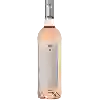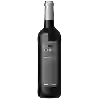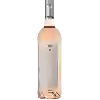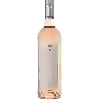
Domaine Grand Mas de LansacCuvée Évidence Rosé
This wine generally goes well with
The Cuvée Évidence Rosé of the Domaine Grand Mas de Lansac is in the top 0 of wines of Alpilles.
Details and technical informations about Domaine Grand Mas de Lansac's Cuvée Évidence Rosé.
Discover the grape variety: César
César noir is a grape variety that originated in France (Burgundy). It produces a variety of grape specially used for wine making. It is rare to find this grape to eat on our tables. This variety of grape is characterized by small bunches, and grapes of medium size. César noir can be found in several vineyards: South-West, Cognac, Bordeaux, Burgundy, Beaujolais, Provence & Corsica, Savoie & Bugey, Rhone Valley.
Informations about the Domaine Grand Mas de Lansac
The Domaine Grand Mas de Lansac is one of of the world's greatest estates. It offers 7 wines for sale in the of Alpilles to come and discover on site or to buy online.
The wine region of Alpilles
The wine region of Alpilles is located in the region of Méditerranée of Vin de Pays of France. Wineries and vineyards like the Domaine de Trévallon or the Domaine de Trévallon produce mainly wines red, pink and white. The most planted grape varieties in the region of Alpilles are Merlot, Cabernet-Sauvignon and Roussanne, they are then used in wines in blends or as a single variety. On the nose of Alpilles often reveals types of flavors of peach, black fruits or white pepper and sometimes also flavors of cassis, clove or mushroom.
The wine region of Méditerranée
Méditérranée is a PGI title that covers wines produced in a large area of the South-eastern coast of France, roughly corresponding to the wine region of Provence but also including Part of the Rhône Valley. The PGI shares its territory with multiple AOC appellations as varied as Châteauneuf-du-Pape, Bandol and Côtes de Provence. The PGI Méditérranée catchment area extends over 10 departments (including the two on the island of Corsica), as well as smaller parts of the Isère, Loire and Rhône departments. Viticulture is essential to the culture and economy of this part of France.
The word of the wine: Biodynamics
Biodynamic farming method initiated by Rudolf Steiner which forbids all chemical treatments based on synthetic products. Biodynamics is based on the interaction between the movements of the planets and the development of plants and uses preparations based on organic and mineral materials.









